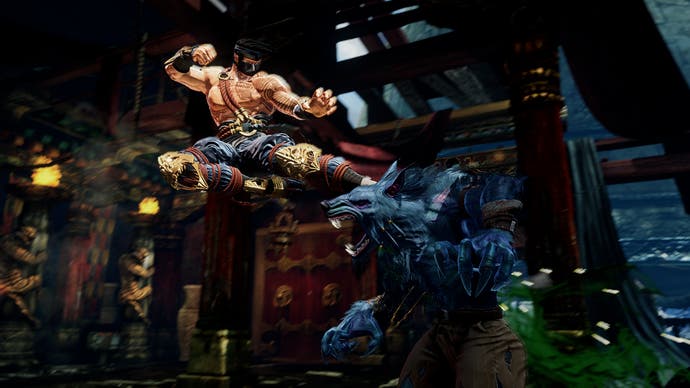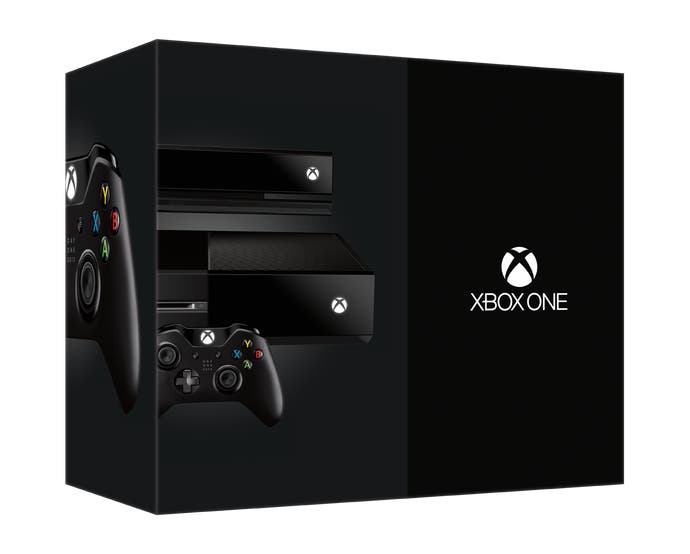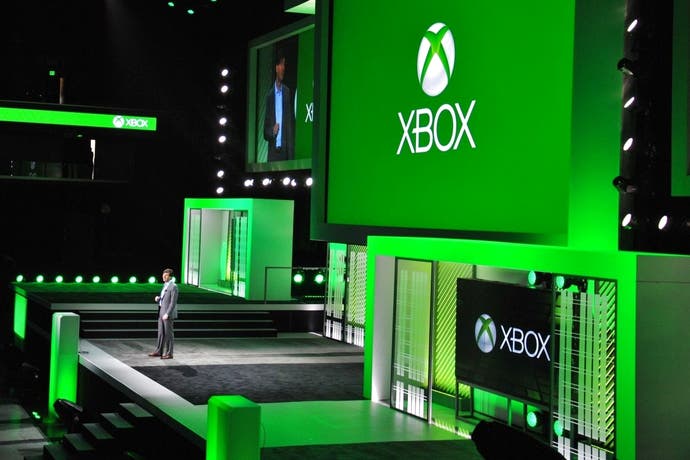The big interview: Microsoft Studio's Phil Spencer discusses Xbox One
On self-publishing, controversial connectivity and a long-term commitment to gamers.

It's been a tough few weeks for Microsoft.
Sony's E3 press conference - and its stance on game ownership - has exacerbated the controversy around the Xbox One. The PlayStation 4 is cheaper than Microsoft's next-gen console, offers developers self-publishing and doesn't require internet authentication. The polls are in, and Microsoft is losing. Badly.
For Phil Spencer, Microsoft's man in charge of games, it's been a tough time too, and, I imagine, more than a bit frustrating. Microsoft's E3 press conference was 90 minutes of games, games and more games - as it announced it would be - and even included the return of fan favourite fighting game Killer Instinct. It was supposed to answer the critics who slammed the company's TV, TV, TV reveal event, and yet in the many meeting rooms of the Los Angeles Convention Center all everybody is talking about is the console - and how PS4 is stomping all over it.
I sit down with Spencer deep within the bowels of Microsoft's packed show floor booth with a burning desire to understand. The criticisms have been made. Now, I want to understand why Microsoft is doing what it's doing with Xbox One. Why is an always connected, always online console so important? How will it benefit gamers? What does it mean for game ownership? And, perhaps most important of all, how will always online benefit games? Let's try find out.
Eurogamer: With next generation games, is it enough to simply improve the graphics by making them prettier and higher resolution at a time when there's so much at stake in the industry and the economy is depressed? Don't we need new ideas, almost new genres?
Phil Spencer: That's a perfect conversation. If you look at the games that were on our stage and, actually, other stages that were on the same day, you saw a big focus from a lot of teams on immersive, connected worlds. If you look at what Titanfall was doing, even if you looked at something like, well, I'll go back to the beginning of the show: European studio Wargaming.net building World of Tanks, they've got over 60 million people playing that game - that game is a service. And more and more as people are thinking about the creative ability not only on the platform that sits in a player's home but also the capabilities when you connect a social community of people who either want to play together or, in the case of the Twitch.tv announcement, watch gaming together, watch entertainment together, you find people where the content of the game is as much what the creators originally created as the players coming together and creating the content on their own through collaboration and competition in the gameplay.
I agree with you: if it's just an upping of the poly count... And I've said that before, and certain people take pot-shots when you start to say it's not all about how fast or how many polys a game is throwing on the screen. What I mean by that, similar to your comment, is that genres are changing, and game creators across all devices are creating connected experiences where the experience expands over time - the community actually impacts in a positive way how the game evolves, how you play the game, who you play the game with. And from Ryse, Killer Instinct, Titanfall, Forza with the Drivatar stuff - I always want to play against cars and drivers that feel like my friends even if they're not online right now - all of this is around a connected ecosystem where people can play together.
"The reaction I see when I walk the [E3] floor is it's packed, and I see, I think, almost every one of our games that are in the launch-ish window for Xbox One up for awards."

Eurogamer: So, are you saying this increased connectivity we're seeing with Xbox One is almost creating a new genre in of itself, almost like the experiences that we're going to get as a result of this increased connectivity will make established genres like racing and fighting and shooting feel different - significantly different?
Phil Spencer: Establishing genres is a bold term. I don't know if I'd go so far as to say we're defining new genres. I see genres evolving as creators get their hands on the tools. And some of the biggest games that I see out in the market today across any device, like a League of Legends, Clash of Clans, World of Tanks - these are proper ecosystems where millions of people come together from across the planet to play these games on a device.
It's interesting to see how console creators are now looking at what's happening on other devices, other devices that are natively connected, and saying OK, how is this going to augment, to advance the kind of genre that I've been in? Turn 10 [Forza] was an example. You see that you have the original creators of Call of Duty bringing Titanfall out as a natively connected game, exclusive to Xbox One. And they're thinking about, what does it mean when you can take a genre like that and build it more specifically with dedicated servers already in mind from kind of idea-one around the game?
Eurogamer: But what does all of that that you just described mean for the Skyrim experience, one that isn't connected really at all - the very single-player-driven experience? Do you feel gamers still want that kind of thing, or in your view is that an outdated kind of experience, just old world thinking?
Phil Spencer: We're building a platform for all kinds of creators. Myself, I don't build games, I run an organisation of studios. We're creating a platform for all styles of games. I wanted to make sure that when we're standing up there - it's why I was trying to do something even as trivial as wearing the State of Decay t-shirt when I came out. So State of Decay, done by a small studio in Seattle that we've known for a while, is having tremendous success and I'm just really happy for the guys there.
Eurogamer: Second-fasted selling XBLA game ever I think?
Phil Spencer: Fastest-selling new IP game. Minecraft is the fastest-selling but obviously it had a history before it came to Xbox.
State of Decay today is an offline game. It's distributed digitally because that makes sense for the game they're building and the price-point it's at and everything else. But it's a standalone single-player game. I think the guys will be OK if I say this: it could use a patch or two to clean up...
Eurogamer: Most games could.
Phil Spencer: Right. So the ability to always update the content that you have on your box to make sure that the bits that you have are the latest bits - on your box or any box that you play on, frankly, because your library's always going to be up to date - is a capability that impacts single-player, multiplayer games, MMO-ish-type games where people come to a connected ecosystem. I wouldn't say those games are out of fashion or out of style in any way. One of my favourite games in the last couple of years was Limbo. I thought it was a great game with a lot of soul. And that kind of creativity is something that we will definitely see continue.
I do think creators are definitely thinking about, what does it mean when you can take a tried and true genre and think about it in a more connected space? And let's face it, the number of games that are created on iOS, Android, Windows - those devices are natively connected. And you see what happens with these genres when they're pushed - and League of Legends is probably a great example, when they're taking advantage of the native state that the box is in - you end up with these massive communities and a very fun game. Riot's done an amazing job with that game. I'm just simply a player of the game but I do think it can expand existing genres to new customers.
"Now that we have a natively connected system in Xbox One, the free-to-play capabilities across many genres are going to open up."

Eurogamer: It's interesting to be an observer to the reaction to the press conference - not just the press conference but the unveiling of Xbox One generally. How would you assess the reaction to the policies you've put in place?
Phil Spencer: It's a good question. We started on this journey years ago, but when you think about the announcement to the world of the product that we're bringing to market this November, we started with our unveil event three weeks ago, where we named the box, we showed the visual identity of the box - those were important things to do at the announcement. We told the entertainment story around the box, we had some partners on stage from EA, Activision, NFL here in the US, which is obviously a huge brand for us, and showed how this box can move into any living room and the role it would play, knowing that three weeks later we were going to be here in Los Angeles at the core gaming show.
At the time I said we're going to go 90 minutes on stage at E3 and do games. And I was reading my Twitter feed and people were wondering, well how many games are going to be Kinect games and are we really going to live up to 90 minutes of games? And I felt like we were able to stand up from minute-one when Kojima-san's game was debuted, Metal Gear Solid [5], all the way through Titanfall, and go 90 minutes of games. And the reaction I see when I walk the floor is it's packed, and I see, I think, almost every one of our games that are in the launch-ish window for Xbox One up for awards. It seems like the content that we put in front of people is really resonating with the core gamers. For me, this is an industry about content, and content helps lead what you're doing with your platform. So I feel really good about where we've ended up.
Eurogamer: But what about some of the policies the Xbox One implements that we haven't seen before? What about the reaction to those?
Phil Spencer: The policy decisions that were made: first, I'm not sure we've never seen these before - if you look at other ecosystems where content exists, there's definitely...
Eurogamer: I mean in regard to Xbox 360 versus Xbox One.
Phil Spencer: So the policies, as we look forward and start thinking about a connected space and, as you've asked, what impact can connectivity have on games themselves and the experiences I'm going to play? And then there are other things that we're thinking about: just as an example, I want your library to be your library wherever you go, similar to my music being mine on the devices that I plug into - my ability to plug in to my television video content wherever I go through services like Netflix and other things. We think about gaming content in the same way, because people are playing games across every device. People have - they're gonna end up with consoles in multiple rooms in their home over time. Not everybody, but you see that happening today. And the physical medium itself - I'm not going to say that this is the predominant case - does have some kind of shelf life (it can be scratched).
Basically what we've said is you can install the bits to the hard-drive and then you have a licence for that content in the cloud for you wherever you go, regardless of what happens to the disc. That content is yours, it will roam wherever you go, it will work, and we think there are distinct advantages of you having the content that you own associated with you and your identity.
"We also know when someone's going to come and buy an Xbox One, we want to make a long-term commitment to that customer; this is a box that will be valid five years from now and relevant and important - will be relevant 10 years from now for consumers."
Eurogamer: I think everyone would agree that those benefits are wonderful, but the trade-off I see is the concept of game ownership is changing. Xbox One means the idea of owning a physical disk and being able to do whatever you want with it, as gamers have done for years, is going away. There's a reaction to that, as this is changing how we think about game ownership.
Phil Spencer: You positioned that very well. We're going through a transition; you've seen this in other mediums. What we thought about was the physical disc does have meaning to people but we want to make sure the secondary market is something we support, so that's why we wanted to put out the policies we put out on Xbox Wire [the press site] to let people know they can gift their content to their friends. They can resell the disc in a secondary market.
As you go through a transition it's definitely true that you're not going to be able to support every single thing. But as you look forward and you think about the benefits, we asked, what are the systems we have to put in place to support these benefits, and what are the features of the existing scenario that we want to make sure we want to support? And we said we wanted to support the secondary market - we put up the policy that said we want to support the secondary market, and that was really in service of the gamers who look at that secondary market as a really important part of their game collecting.
Eurogamer: You say that, but how is it going to work long-term? Will Xbox One games last you years and years and years, as they have done in the past? Can you turn them off? Can they be made inactive in any sense?
Phil Spencer: Microsoft is obviously a big company and we're in this business for the long-run, we've shown that over the last decade - the original Xbox, the Xbox 360 - we've had a commitment to gamers and a commitment to the customers. We've run the Xbox Live service now for many years, and we've learned what it means to run a global entertainment network. We're now 47 million people-plus on that network, and our commitment to the services that we offer through Xbox Live has always been one of our key principles when we think about how we're going to run the business - service availability as well as just continuing to grow the capabilities.
When we think about content that's associated with your account, we think about it in exactly the same way: when somebody buys content from us, it's a commitment we have that content will work for them, it will roam with them - they will have the advantages of the license associated with their identity, whether you go to your friend's house and you want to play the games that you own, if you want your family to be able to play all of the games in your library - your library is going to roam with you. There's some distinct advantages across any console in your home - there's some distinct advantages that we're trying to put in place. And that's a commitment to we have to the customer in the long-run, absolutely.
"We put up the policy that said we want to support the secondary market, and that was really in service of the gamers who look at that secondary market as a really important part of their game collecting and game play."
Eurogamer: I want to ask about indie games and why you decided not to enable self-publishing when so many of your competitors and other places do?
Phil Spencer: Today what we've said is we don't have a self-publishing system in place. But what we do look at: we support the indie development community, we've had over 200 developers ship over 400 games on our platform; over a billion dollars in revenue for independent developers selling content through our ecosystem. From the beginning of Xbox Live we have been committed to indie games, and we will continue to do that. Things like self-publishing, things like discovery of content, things like promotion - these are things that we are committed to, and our platform will evolve.
If you could boot your Xbox 360 seven years ago when it launched, when you first bought it and you looked at the experience we had, and over the years how we added functionality... We understand the desires of certain developers out there. We want all the developers to work on our platform. We want to make a commitment to the plans we have in place and what we're launching and that's what we're doing today.
Making sure content shows up on our platform, you understand what content people are playing. So you see trending; you have search to search for any piece of content to make sure that any pieces of content that hit Xbox One are actually discoverable and easily purchasable; and then part of your library that roams with you wherever you go - that's an important step. And that's what we're committed to at launch. We want to make sure we're making the right commitments at the right time. Our ears are open on self-publishing and other changes and advancements in our publishing ecosystem, but I don't want to stand up and commit to things that aren't plan of record now. That would be wrong.
Eurogamer: So, to be clear, you're open to the possibility of self-publishing in the future? Things may change?
Phil Spencer: Absolutely.
Eurogamer: I'm hearing a lot from indie developers that they'd hoped Microsoft would implement self-publishing for Xbox One because at the moment they need a publisher and that can be difficult for some studios.
Phil Spencer: The diversity of content that was available on Xbox 360... I mentioned Limbo and you can go back to Braid and you can look at a tonne of content: Trials HD, Castle Crashers. I'm really liking Charlie Murder; that's a two-person studio, a husband and wife, I don't know if you get much smaller and indie than that - and now they're part of Summer of Arcade. Making sure that we have content from all kinds of creators showing up on our platform is the long-term commitment from us.
I'll also say that we look at what goes on in the Windows space. There's a collection of our ecosystem that can be helpful to people over time when you think about all the devices where Xbox Live is available. Over time, as we continue to evolve our platform and our support of developers, it's a real possibility for us to open up a very wide surface area for these developers to think about.
"Our ears are open on self-publishing and other changes and advancements in our publishing ecosystem, but I don't want to stand up and commit to things that aren't plan of record now."
Eurogamer: There are two games at launch that are free-to-play, one of which is Killer Instinct. It would be great to get some insight into what you're doing in this space. Clearly free-to-play is a big deal on PC and it looks like you're starting to dip your toe into that.
Phil Spencer: Now I want to make a distinction, and some of this is just definitional to make sure we understand things. World of Tanks is a free-to-play game; Happy Wars that we shipped last fall is a free-to-play game. Free-to-play games for me, and I don't know if there's any kind of approved definition, I can play through the whole game for free and I can grind and I can unlock capability in the game through some form of purchase. Killer Instinct is a game where we're giving you one character for free and you can play that character through the whole game. You'll also be able to buy all the characters. Or you can buy individual characters. Now we haven't announced pricing or anything, but it's going to be reasonable pricing within our ecosystem that people would expect.
Now on the question of free-to-play: I'm a big supporter of free-to-play, and it's a genre that can come to console. We're having really good success with Happy Wars; Crash Course 2 we just shipped on the platform; World of Tanks, which is frankly one of the biggest free-to-play games out there, we announced is coming exclusively to our platform - having Viktor [Kislyi, CEO] on stage was great. We think that's another business model that really opens up when you have a connected ecosystem where you can - the marketplace is already there. Now that we have a natively connected system in Xbox One, the free-to-play capabilities across many genres are going to open up.
Eurogamer: Was Xbox One being always-online from the very beginning - and I'm trying to understand this, I think everyone is trying to understand this - about looking to the future, almost five, 10 years in the future and seeing where things are going and almost getting there early and planning for the this digital life that we are going to lead? Is that what this about: trying to look into the future and give us that now?
Phil Spencer: Looking into the future is always a challenge. I don't claim to know what's coming in the future. We can see examples on other devices today where a majority of your media has gone digital and there are distinct advantages to that. I'm not even sure I would say it's five or 10 years from now. If you think what's happened in music and books and television shows it's kind of here. We also know when someone's going to come and buy an Xbox One, we want to make a long-term commitment to that customer; this is a box that will be valid five years from now and relevant and important - and will be relevant 10 years from now for consumers.
Look at what we've done with the 360 over the time it's been in market: it's had an amazing run. It's been great that the gamers have been there. They've supported the platform, they've supported Live and the creators that are on the box. We've redone the dash of the box three times, if you think about the original blades on your Xbox and the different experiences. We've continued with diversification of business model. We've brought in more video content and we'll continue to evolve that.
With Xbox One it's exactly the same. I want to think, as much as I can, forward five or 10 years and say, what are the things that are going to have to be in place for this machine to be as relevant then as it is now? Connectivity I think is going to be core to that.




